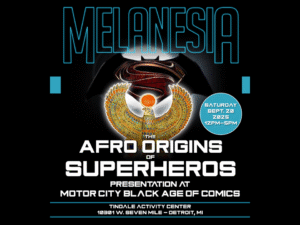Amos N. Wilson: A Visionary Scholar of African-Centered Psychology

Who Was Dr. Amos Wilson?
Amos Nelson Wilson (1941–1995) was an African American theoretical psychologist, social theorist, and Pan-African thinker whose work focused on the psychological, social, and economic challenges facing people of African descent. Born in Hattiesburg, Mississippi, Wilson earned his undergraduate degree from Morehouse College and went on to complete his master’s degree at The New School for Social Research and his PhD in psychology from Fordham University. His academic career included teaching at the City University of New York and the College of New Rochelle, where he influenced countless students with his groundbreaking ideas. Wilson’s work as a psychologist, social caseworker, and probation officer in New York City further informed his understanding of systemic inequities and their impact on Black communities.
Body of Work

Wilson’s scholarship centered on the power dynamics between Africans and non-Africans, which he identified as the root cause of racism and global Black subjugation. He argued that racism was not merely a matter of individual prejudice but a structural phenomenon perpetuated by disparities in power. Wilson believed that addressing these power imbalances was essential to dismantling racism and achieving true liberation for African people worldwide. His work emphasized the need for Black self-determination, economic independence, and a reclamation of African identity and consciousness.
A key theme in Wilson’s work was the critique of Eurocentric education and its failure to meet the needs of African-descended people. He argued that education should be tailored to the specific historical, cultural, and economic realities of Black communities. In his book Awakening the Natural Genius of Black Children (1992), Wilson called for an African-centered approach to education that nurtures the innate potential of Black youth and equips them to solve the unique challenges facing their communities. He believed that education must serve the biological and cultural survival of African people, rather than conforming to Eurocentric standards.
Wilson’s most influential works include The Developmental Psychology of the Black Child (1978), Black-on-Black Violence (1990), and Blueprint for Black Power (1998). In these books, he explored the psychological and social factors contributing to issues such as Black-on-Black violence, systemic oppression, and self-hatred. Wilson argued that many of these problems stemmed from the internalization of white supremacy and the lack of collective Black power. He advocated for the development of Black institutions, economic systems, and political strategies to counteract these forces and build self-sustaining communities.
In The Falsification of Afrikan Consciousness (1993), Wilson critiqued Eurocentric historiography and psychiatry, arguing that they distorted African identity and consciousness. He called for a reclamation of African history and culture as a means of restoring psychological and social well-being. Wilson also warned against the illusion of perpetual progress, emphasizing that integration and racial harmony were contingent on economic stability. He urged Black people to prepare for potential disintegration and to build self-reliant systems that could withstand systemic collapse.
Amos Wilson’s Blueprint

Wilson’s ideas extended beyond academia into practical strategies for Black empowerment. He believed that true liberation required a transformation of societal structures and power relations. His work inspired grassroots movements, educational initiatives, and economic development projects aimed at fostering Black self-determination. Wilson’s emphasis on African-centered consciousness and collective action continues to resonate with scholars, activists, and community leaders.
Legacy
Amos N. Wilson passed away in 1995 at the age of 53, but his legacy endures through his writings and the institutions he inspired. His work remains a cornerstone of African-centered psychology and Pan-African thought, offering a powerful framework for understanding and addressing the challenges facing Black communities. Wilson’s call for self-awareness, cultural pride, and systemic change continues to guide efforts toward Black liberation and empowerment worldwide.
Books by Dr. Amos Wilson
- Blueprint for Black Power: A Moral, Political, and Economic Imperative for the Twenty-First Century
- Black-On-Black Violence: The Psychodynamics of Black Self-Annihilation in Service of White Domination
- The Falsification of Afrikan Consciousness: Eurocentric History, Psychiatry and the Politics of White Supremacy (Awis Lecture Series)
- The Psychology of Self-Hatred and Self-Defeat: Towards a Reclamation of the Afrikan Mind
- Issues of Manhood in Black and White
- Awakening the Natural Genius of Black Children
- Afrikan-Centered Consciousness Versus the New World Order: Garveyism in the Age of Globalism (AWIS Lecture Series)
- The Developmental Psychology of the Black Child
- Understanding Black Adolescent Male Violence: Its Remediation and Prevention (Awis Lecture Series)




